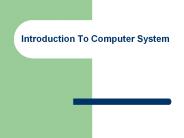Basic Components of a Computer - PowerPoint PPT Presentation
1 / 21
Title:
Basic Components of a Computer
Description:
But, in terms of decision making, 'information' is different for different ... Concerned with tactical decision making. ... Let's make a quick summary: ... – PowerPoint PPT presentation
Number of Views:73
Avg rating:3.0/5.0
Title: Basic Components of a Computer
1
Basic Components of a Computer
- Hardware
- Software
2
Hardware Devices Functions
3
Hardware Devices Functions
4
Types of Software
- Operating System Software
- Organizes the information in the computer
- Acts as an interface between the computer and the
user - Programming Languages
- Application Software
- Generic Application Software
- Wordprocessors
- Spreadsheets
- Database Management Systems
- Industry Applications
5
Database Systems collect and store large amounts
and different types of information
DATABASE SYSTEMS
STUDENTS
ORS (AIRS)
DEPARTMENTS
- Curriculum
- Courses offered
- Academic Staff
6
Different people use the database system for
different purposes
STUDENTS
DEPARTMENTS
- Personal Info
- Registration
- Transcripts
- GPA
- Standing
- Repeat, prob, satis
- Offer courses
- How many registered
- New section
- Curriculum
- Change programs
- Academic staff
7
Database Systems are used to transform DATA into
INFORMATION
?
INFORMATION is based on processed data that is
directly useful.
DATA is collected facts that generally are not
useful without further processing.
8
INFORMATION
DATA
DATA Students letter grades
processing
INFORMATION Standing of the student
9
Structure of a Database Management System
- Data
- Raw facts
- Field
- Group of characters with specific meaning
- Record
- Logically connected fields that describe a
person, place, or thing - Database System
10
C_NAME Customer name A_NAME Agent
name C_PHONE Customer phone A_PHONE Agent
phone C_ADDRESS Customer address TP
Insurance type C_ZIP Customer ZIP code AMT
Insurance policy amount in
thousands of REN Insurance renewal date
CONTENTS OF THE CUSTOMER FILE
11
TRANSACTIONS
- Add
- Delete
- Edit
- Transactions are the lifeblood of a DATABASE
SYSTEM. - It is vital that the transactions are accurate.
Otherwise we have, - Garbage in- Garbage out
- GIGO
12
Now we all know that in a database we always
work with files (not a single file). You can
keep your hotel records manually if you have a
20-bed small hotel! But is it still possible to
work with the same manual system, where there
will be huge numbers of files if you have a hotel
like WOW Topkapi Palace, which has 10 pools, 15
restaurants, etc.? Is it possible to run Migros
with a manual sales and inventory system? Is it
possible to run a Registration and Student
Information System manually in Bilkent?
13
The answer is NO. Why not?So, what do we need to
work faster and accurate?
- We need computers.
- Using computers for data processing is called
Electronic Data Processing (EDP). - Why is EDP so essential?
- Because it is faster, more accurate and it has a
big storage capacity.
14
Introducing the Database
- Data
- raw facts
- raw indicates that the facts have not been
processed to reveal their meaning - Information
- processed data
- on which to base decisions
- So whether keeping the data manually or by the
help of EDP, the data processing is the
conversion of Data into Information that can be
used for MAKING DECISIONS.
15
What does a manager require to make a good
decision?
- JUDGEMENT ? Experience
- ? Wisdom
- INFORMATION
16
How can the decision-makers (usually the
managers) get all this information in an
organization?
- By the help of information reporting
systems...These systems provide routine reports
that are needed by managers.
17
An Information Reporting System is the base of a
Management Information System (MIS).A MIS is a
formal information network that provides
management with the information necessary for
decision making.
- The goal of MIS is to get the correct information
to the correct people at the right time. - But, in terms of decision making, information
is different for different people in an
organization. - So what does this mean?
18
If a receptionist has the information that Mr.
Thompson is staying in room 202, is it a useful
information for her? What about the Sales
Manager who gives some strategic long-term
decisions for the hotel at the end of the
year?Is this useful for the SM as well?
19
LEVELS OFTHE MANAGEMENT PYRAMID
- Lower Level Management
- Members of the lowest level in the management
hierarchy make operating decisions to ensure that
specific jobs are done. These operational
decisions will affect a single department or a
single employee. - Middle Level Management
- Concerned with tactical decision making.
Information reports are used to evaluate possible
needs for procedural changes at this level. These
decisions will affect a division or a group of
departments. - Top Level Management
- Concerned with strategic decision-making. These
decisions will affect the entire organization.
Activities at this level are future-oriented and
involve a great deal of uncertainity. It
considers the long-term needs of the business.
Strategic Level
Tactical Level
Operational Level
20
Lets make a quick summary
- The emphasis in data processing is on the
short-term or daily operations of an organization
whereas the emphasis in a MIS is on intermediate
and long-range planning. - The goal of a MIS is to get the correct
information to the correct manager at the right
time - Manager does not need any information which is
not complete. So the valued information is
accurate, verifiable, timely, relevant, complete
and clear. - The quality of information is very important.
- GIGO or Garbage in-Garbage out.
21
Review Questions
- How does data differ from information? Give
examples for both data information. - What is the objective of EDP?
- Why is GIGO an important concept in information
processing? - What is the emphasis of an MIS? What is its goal?































